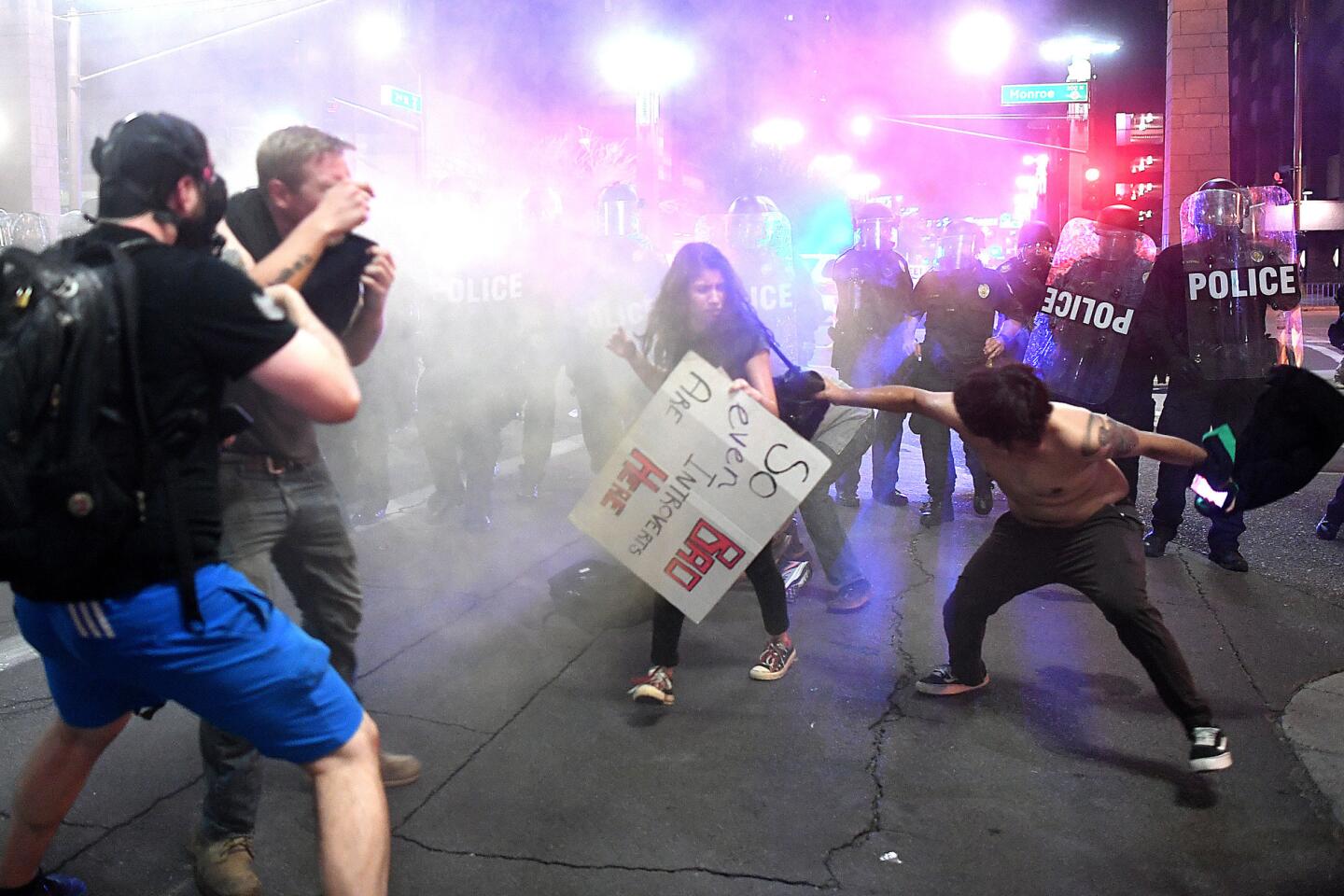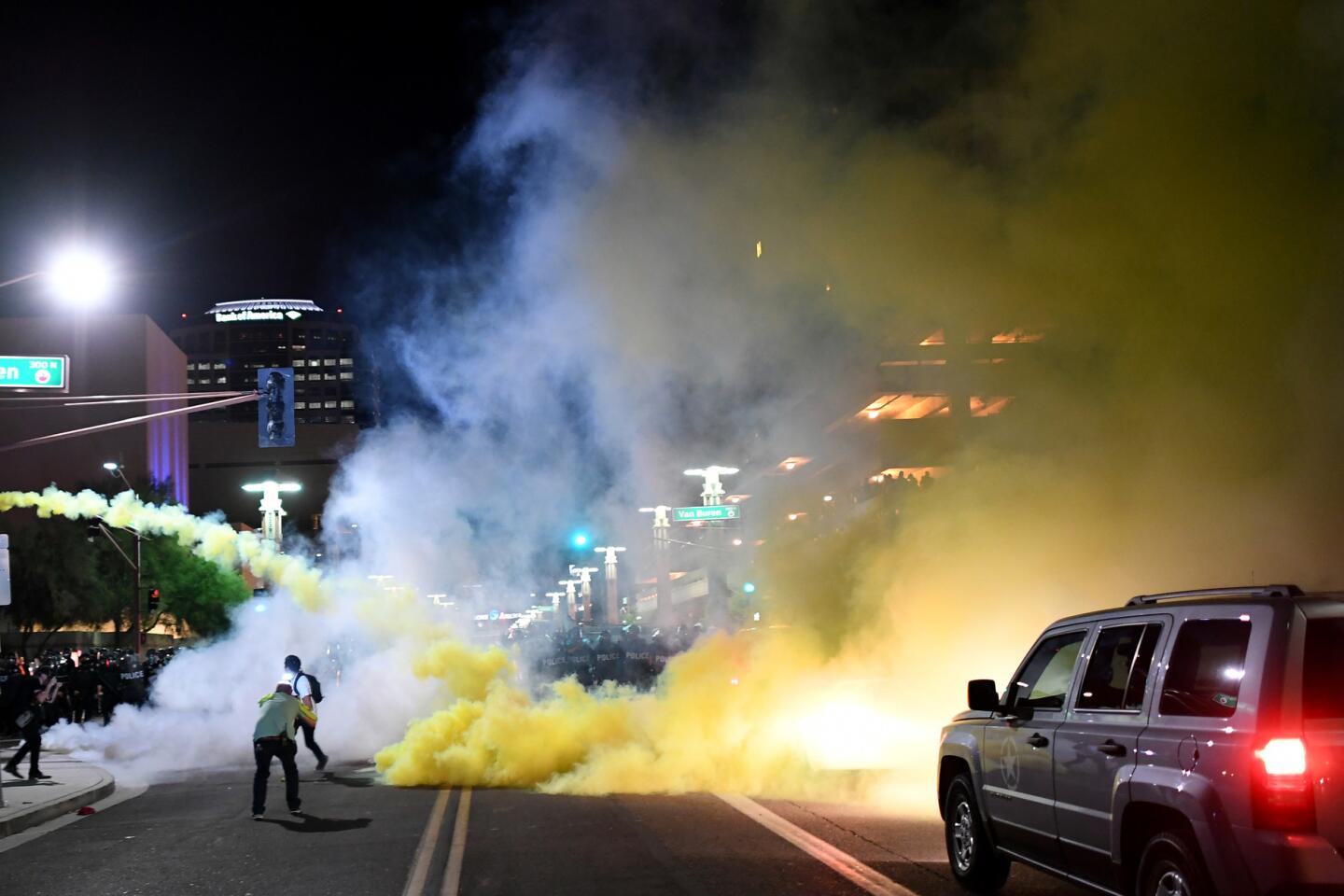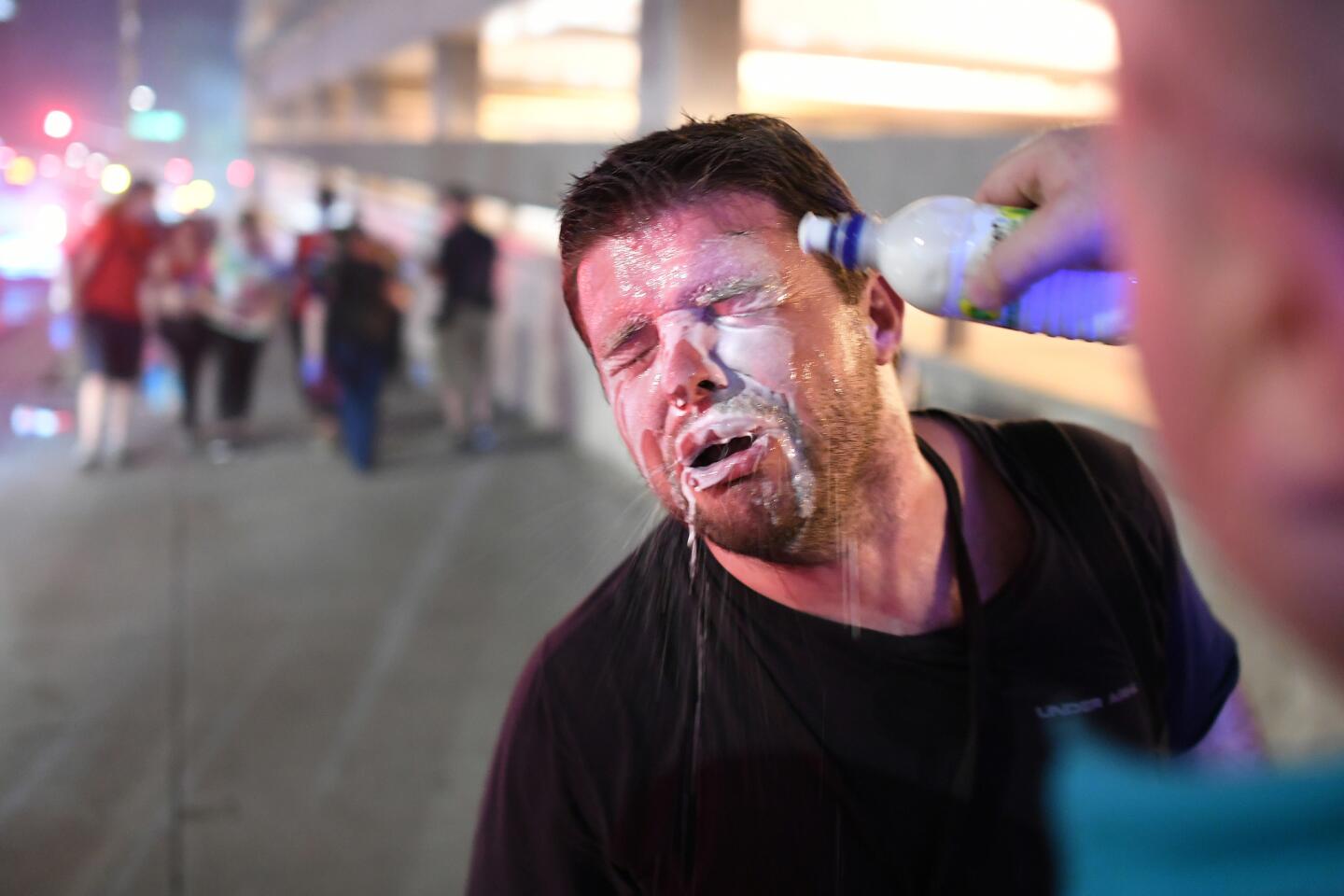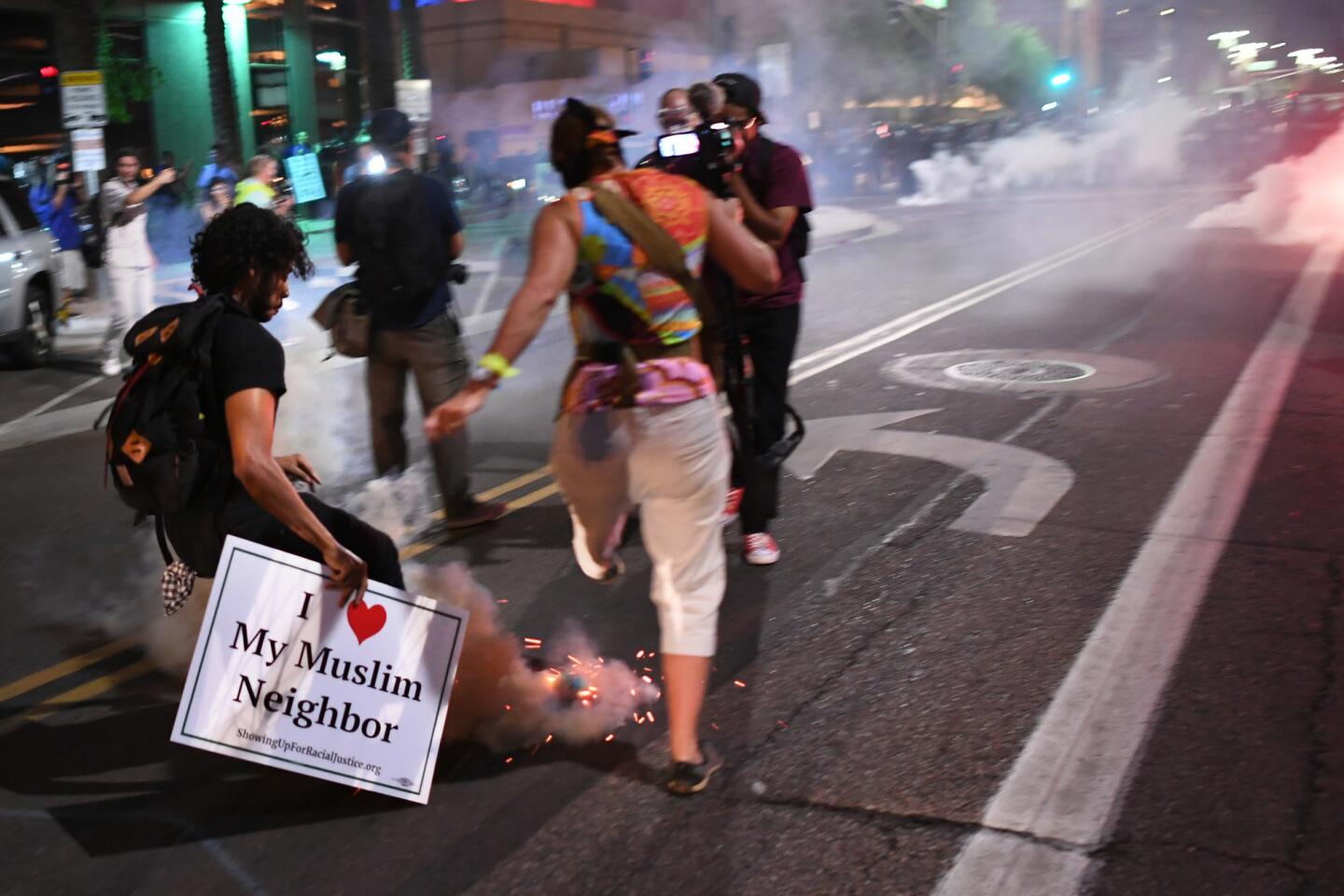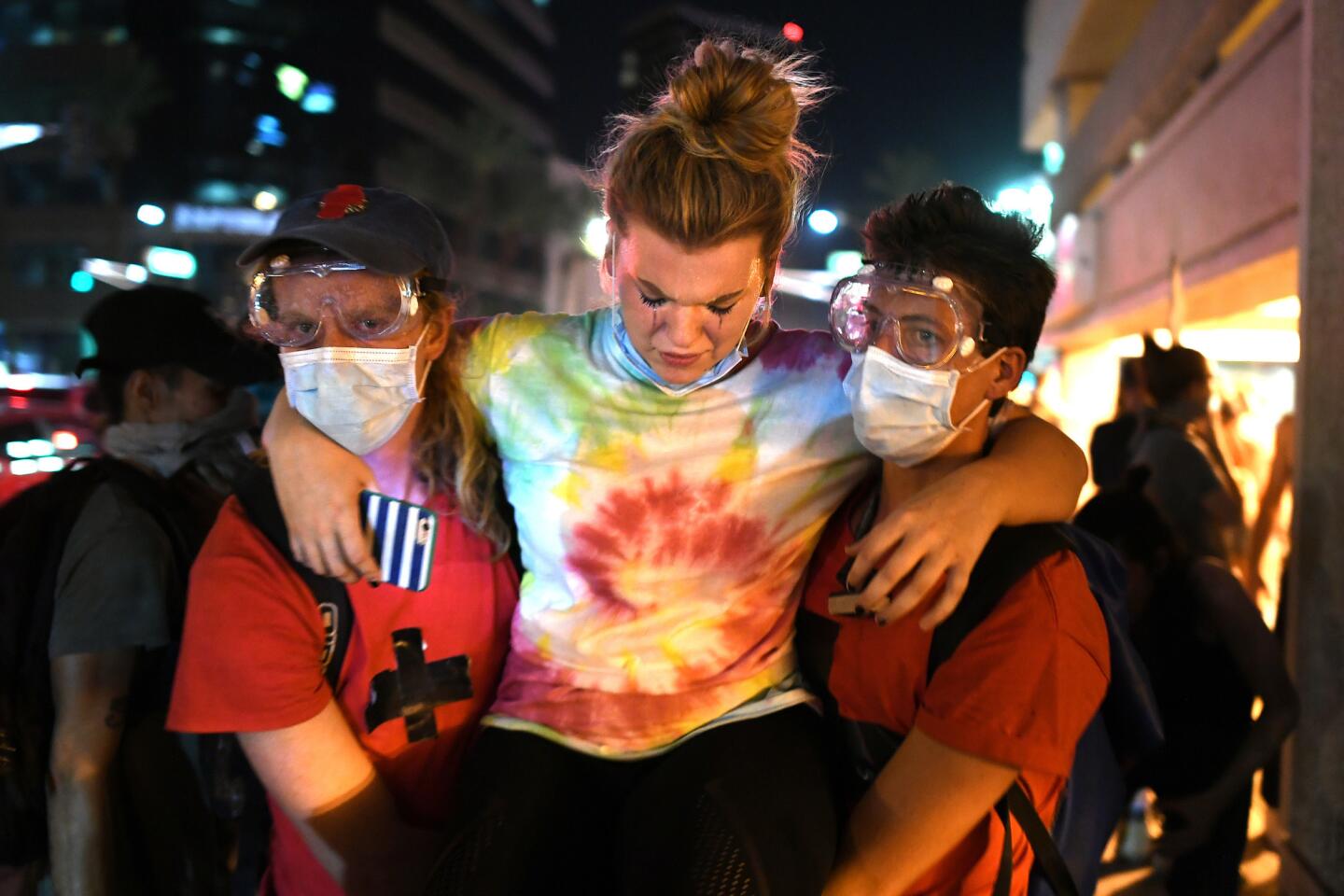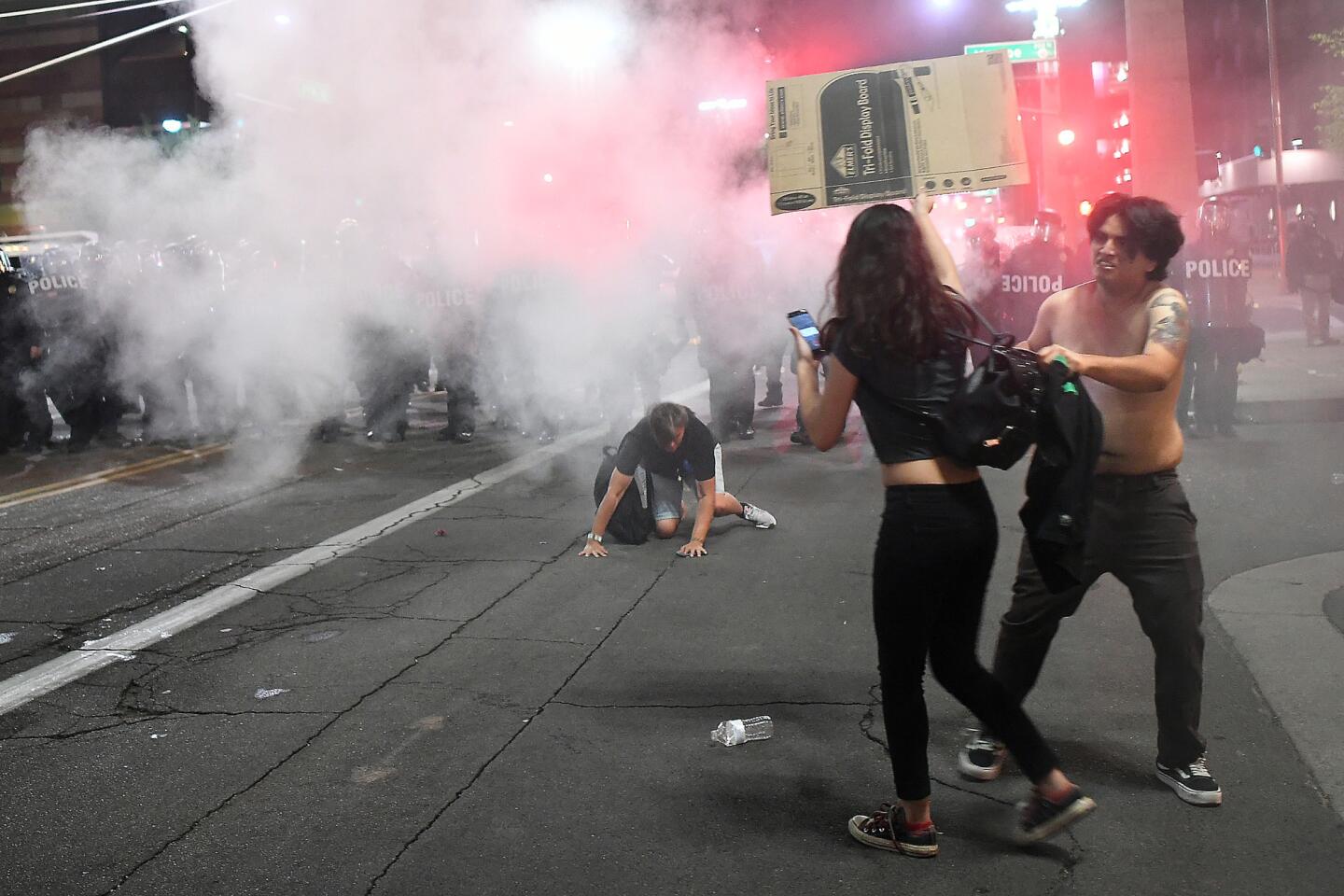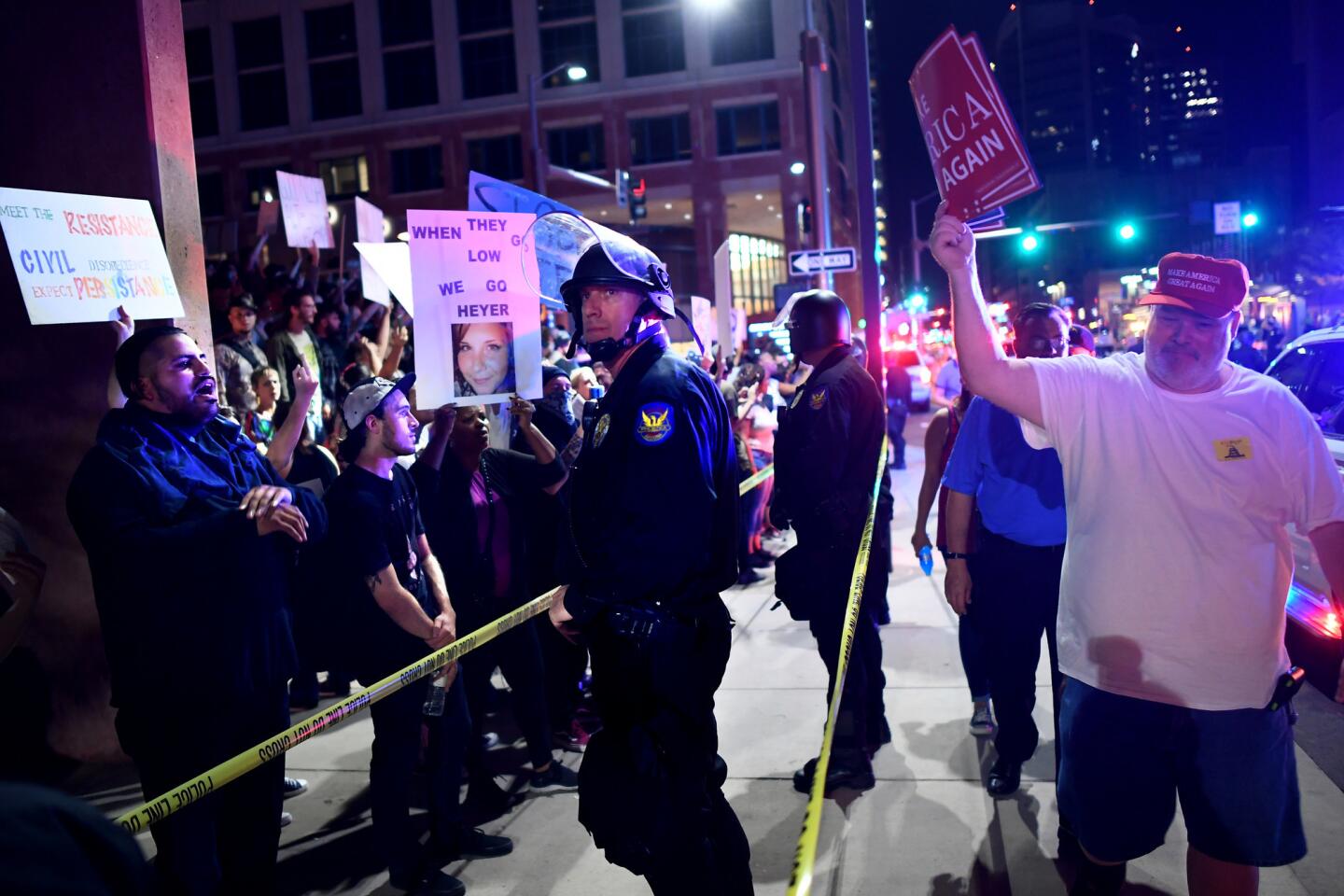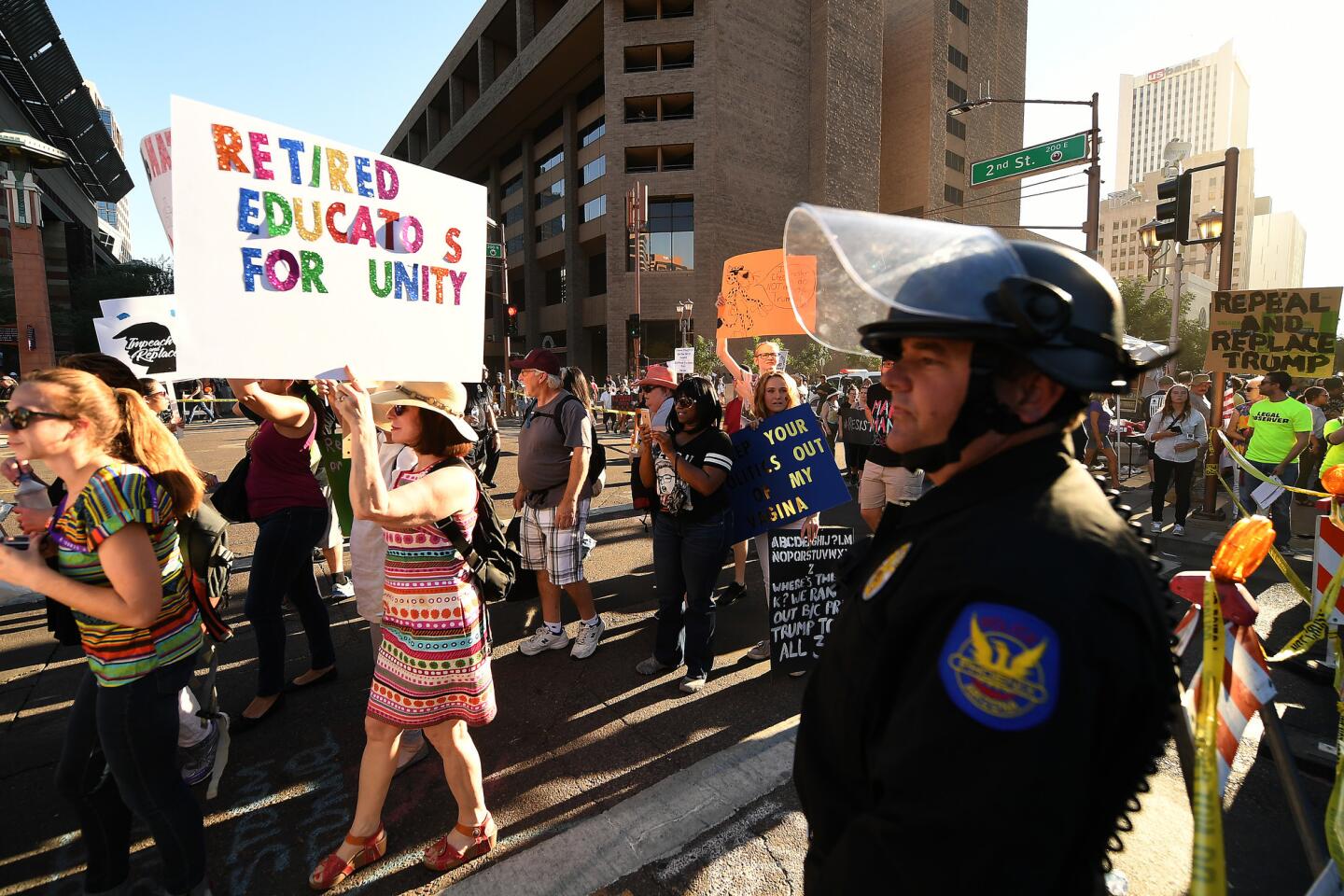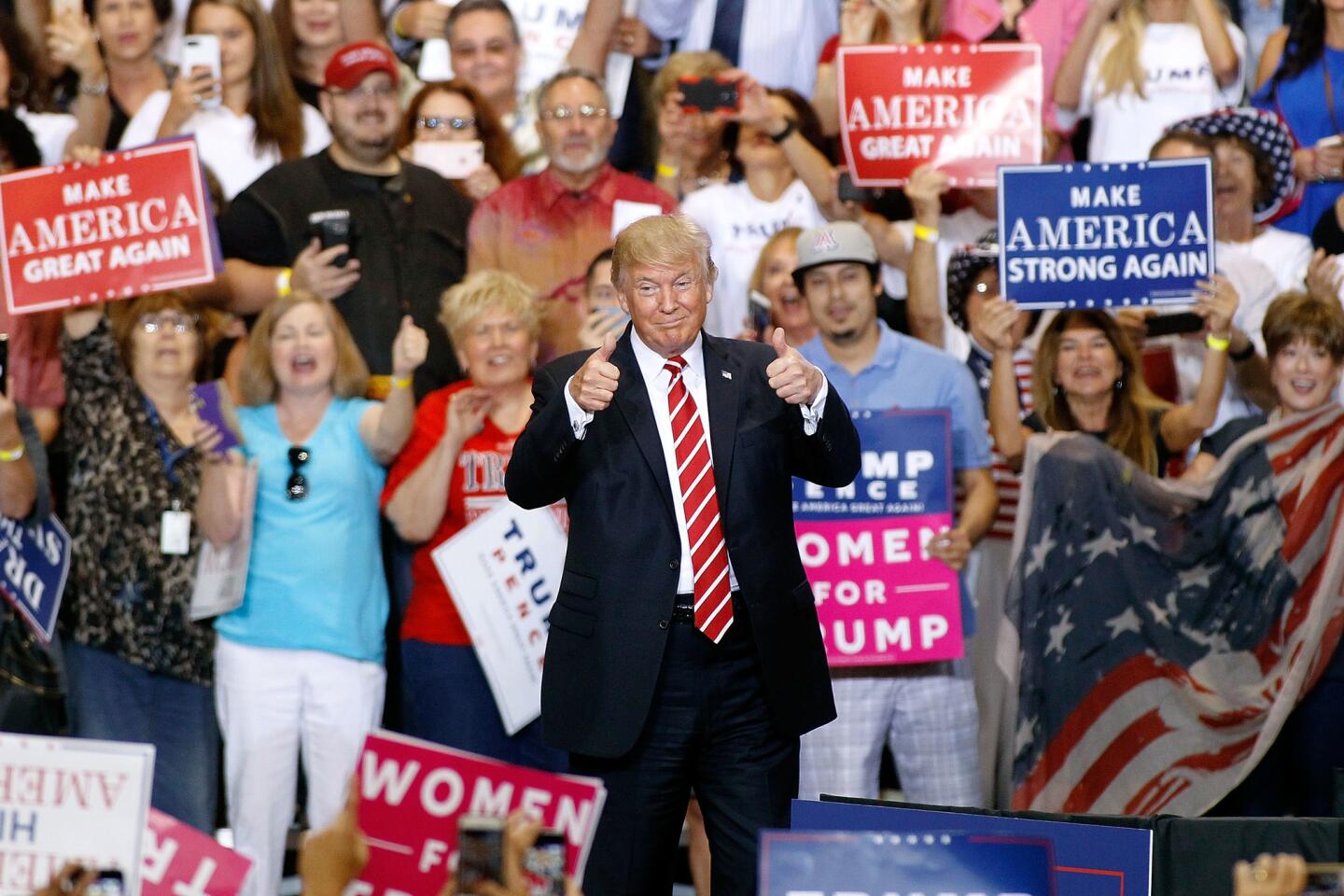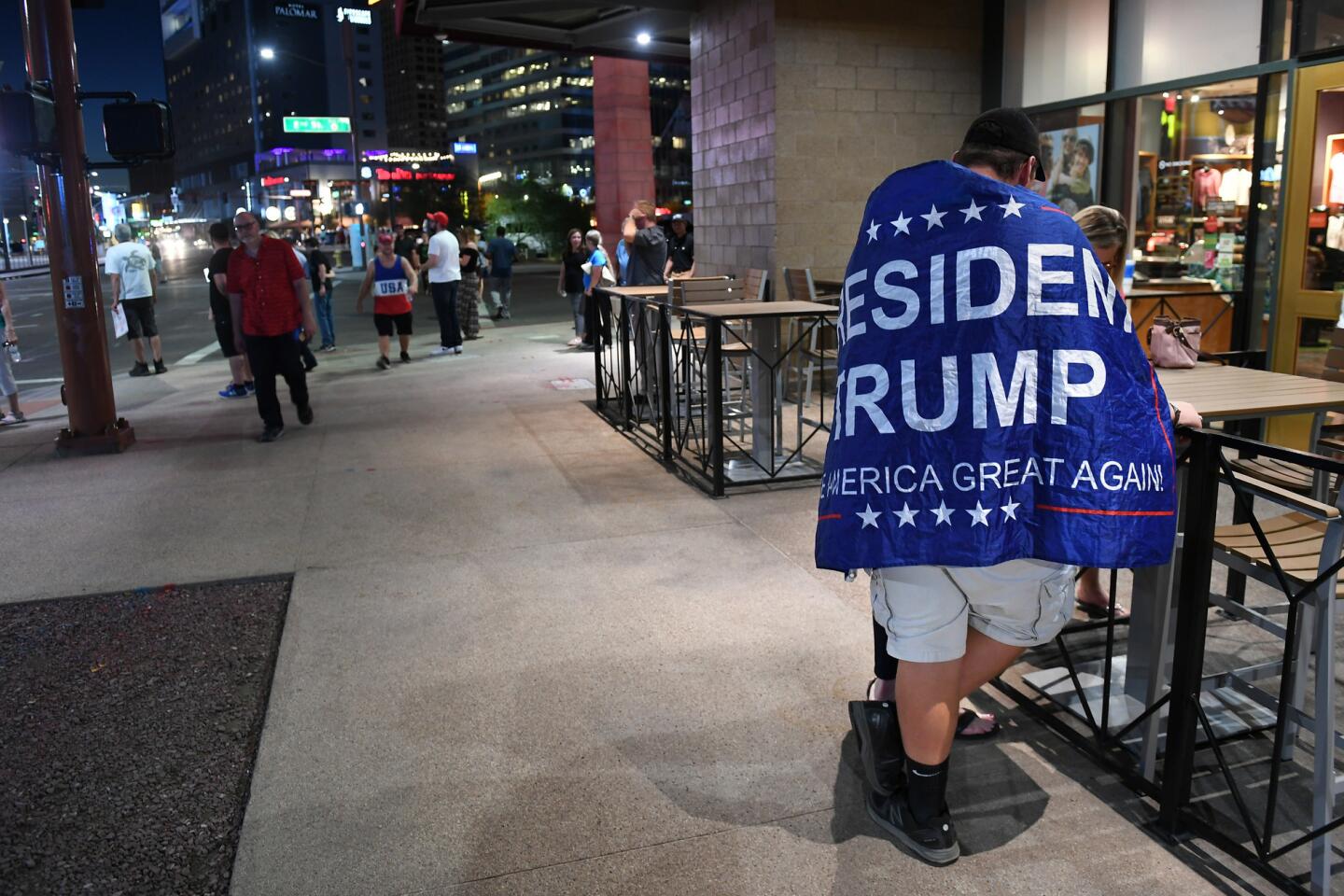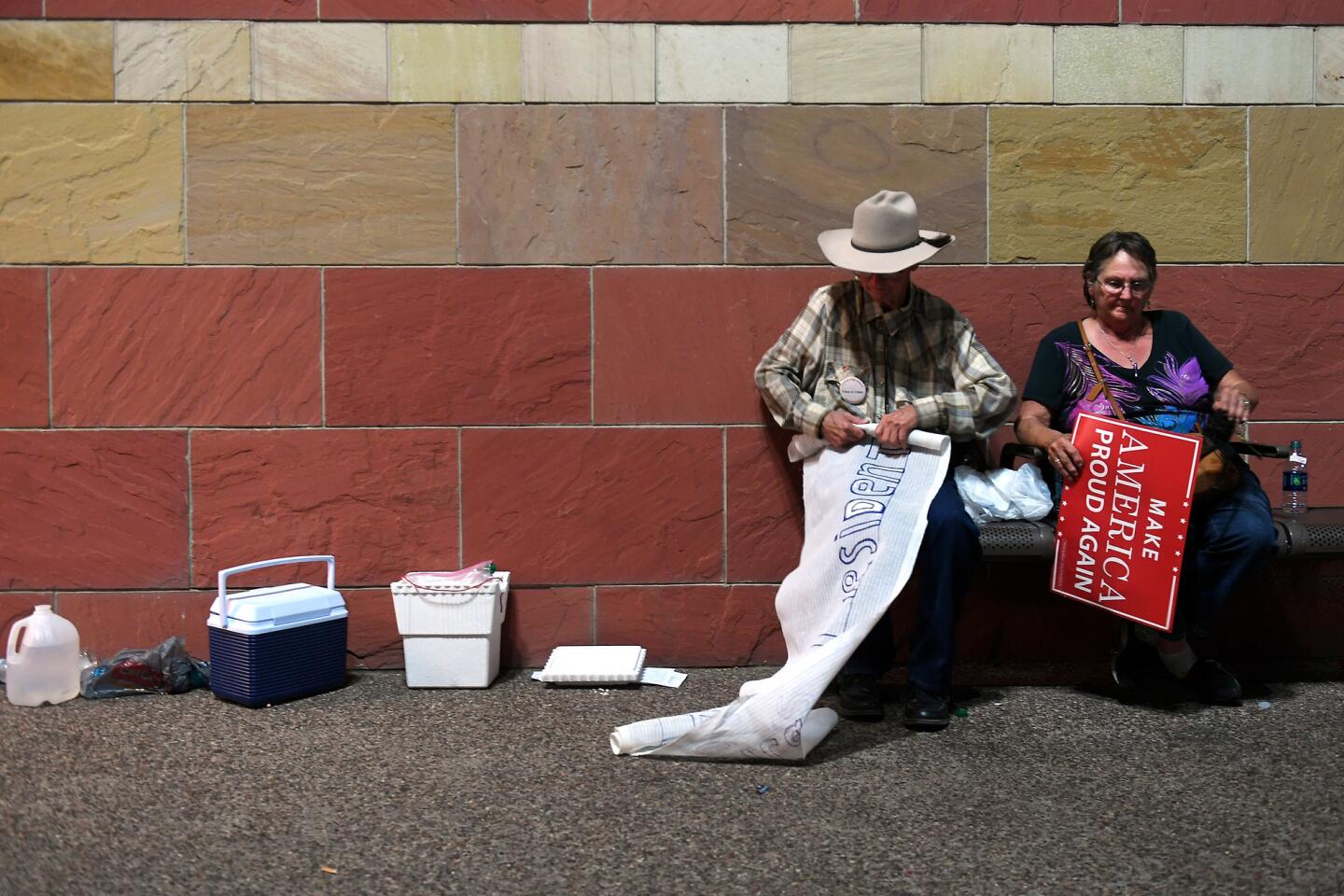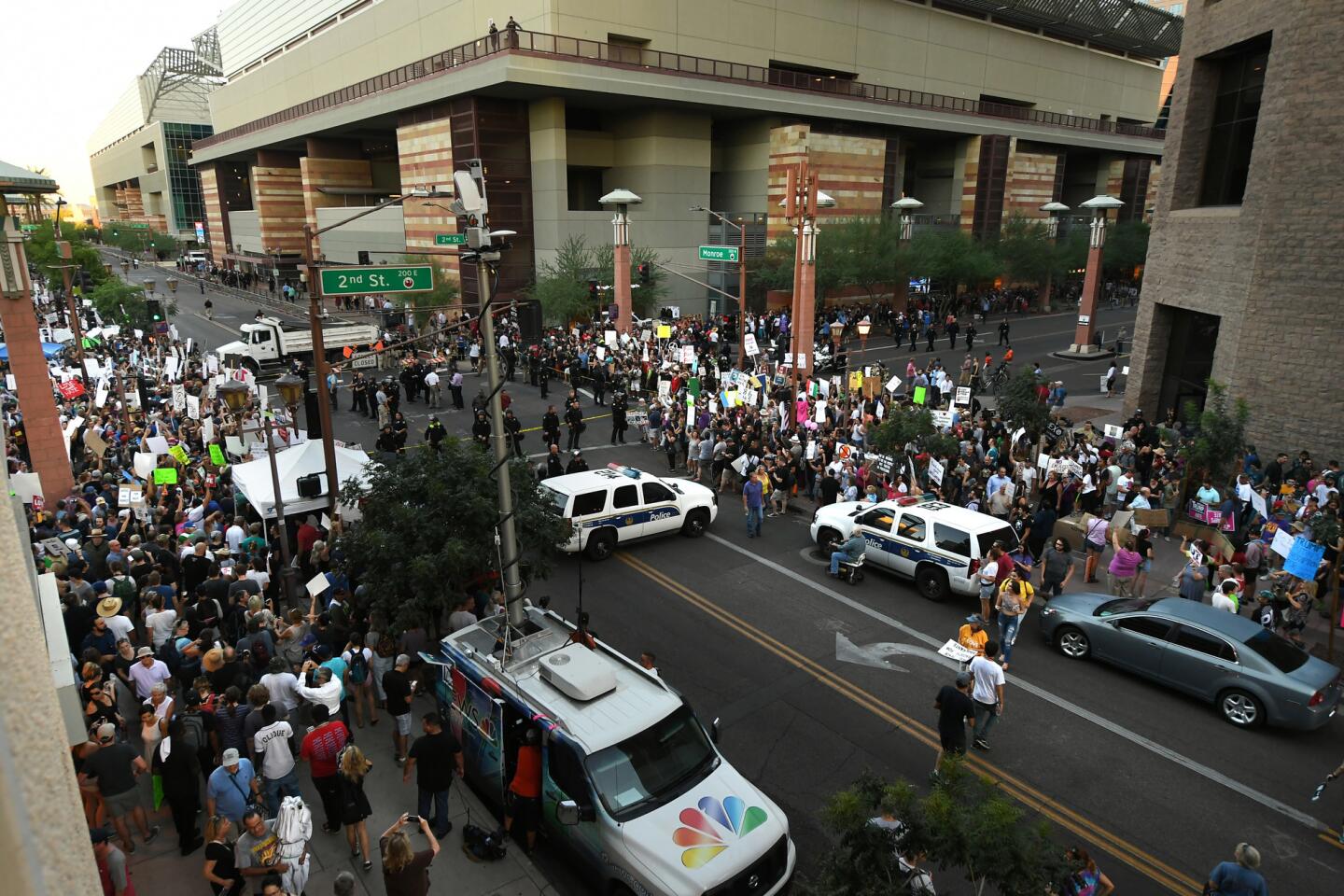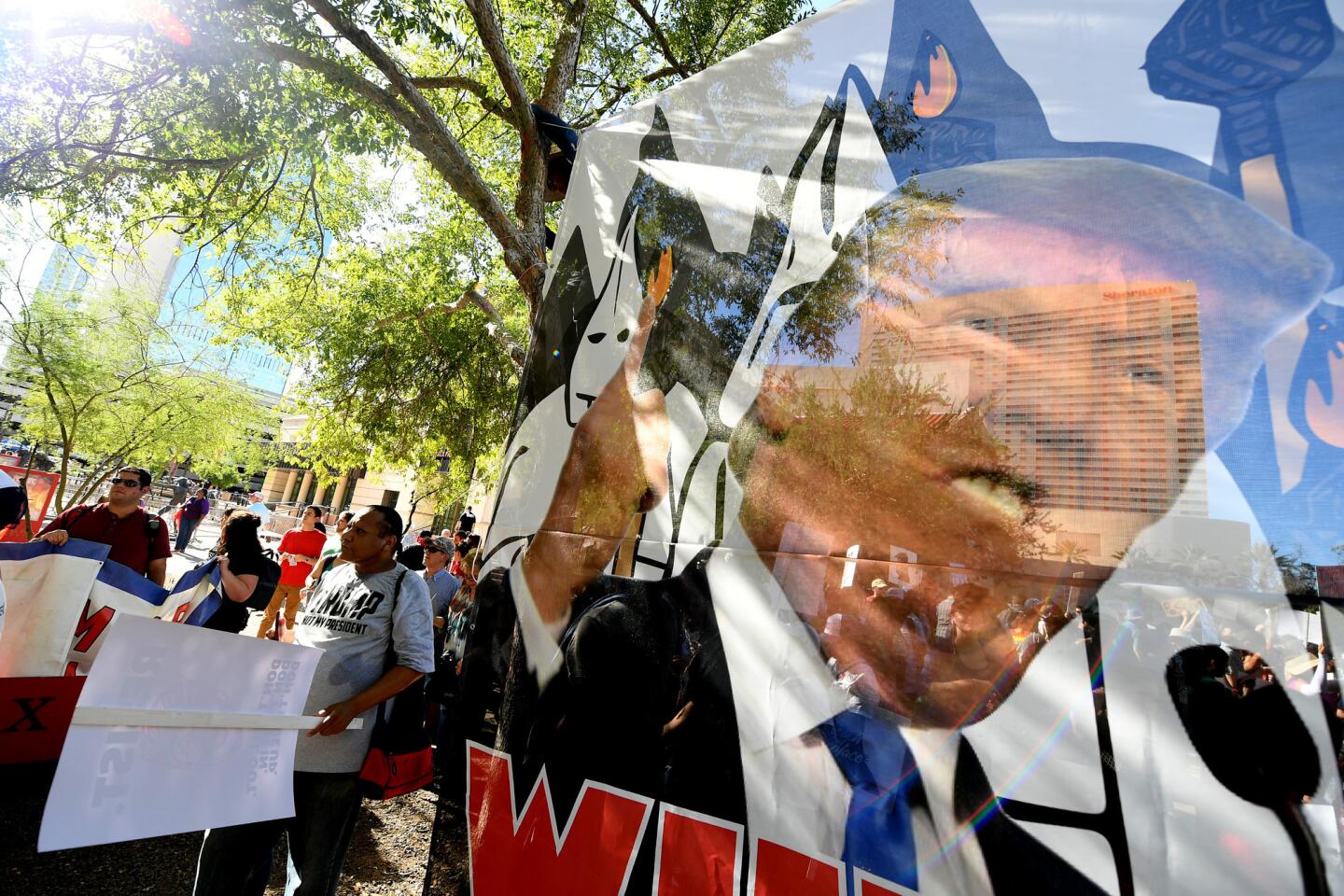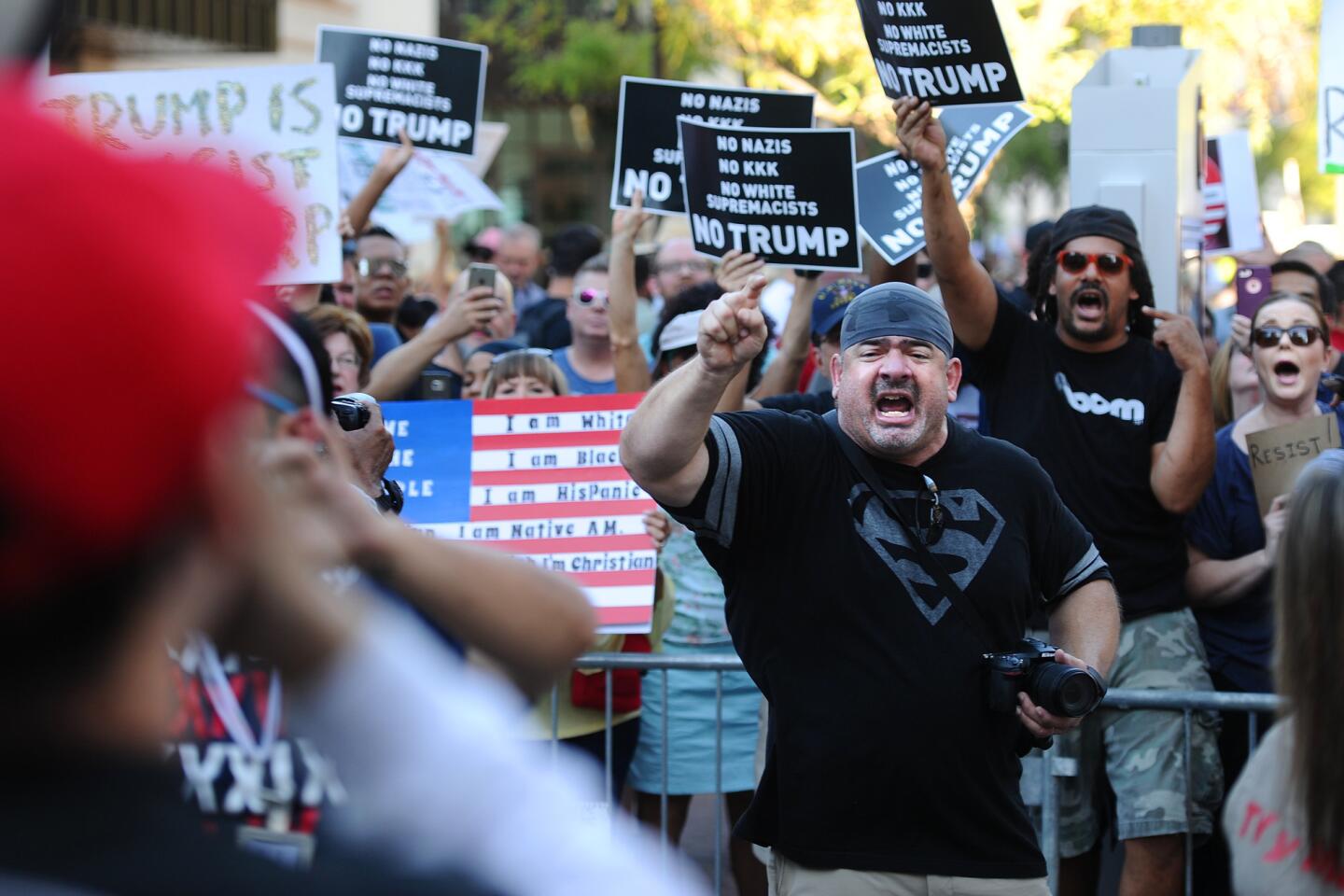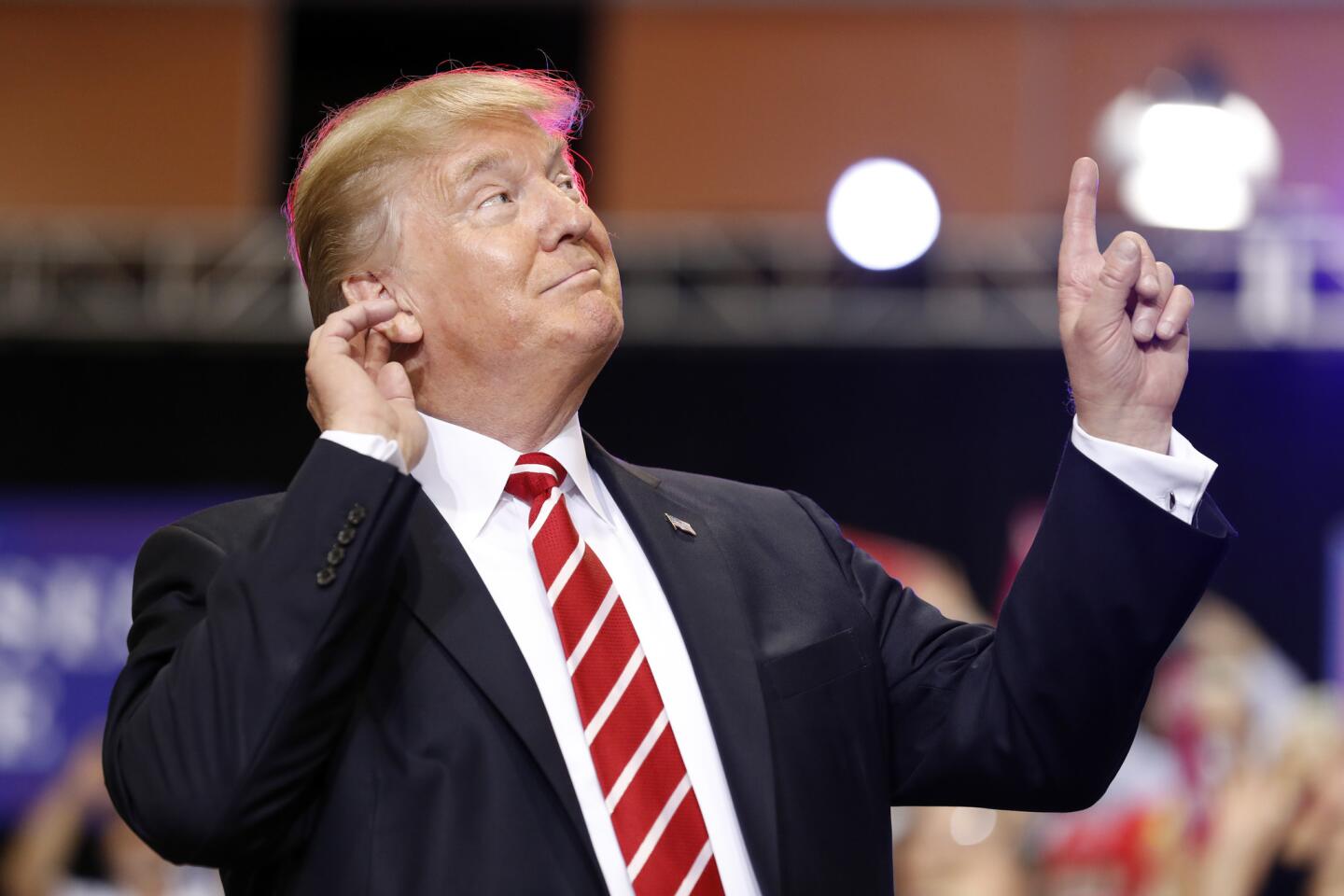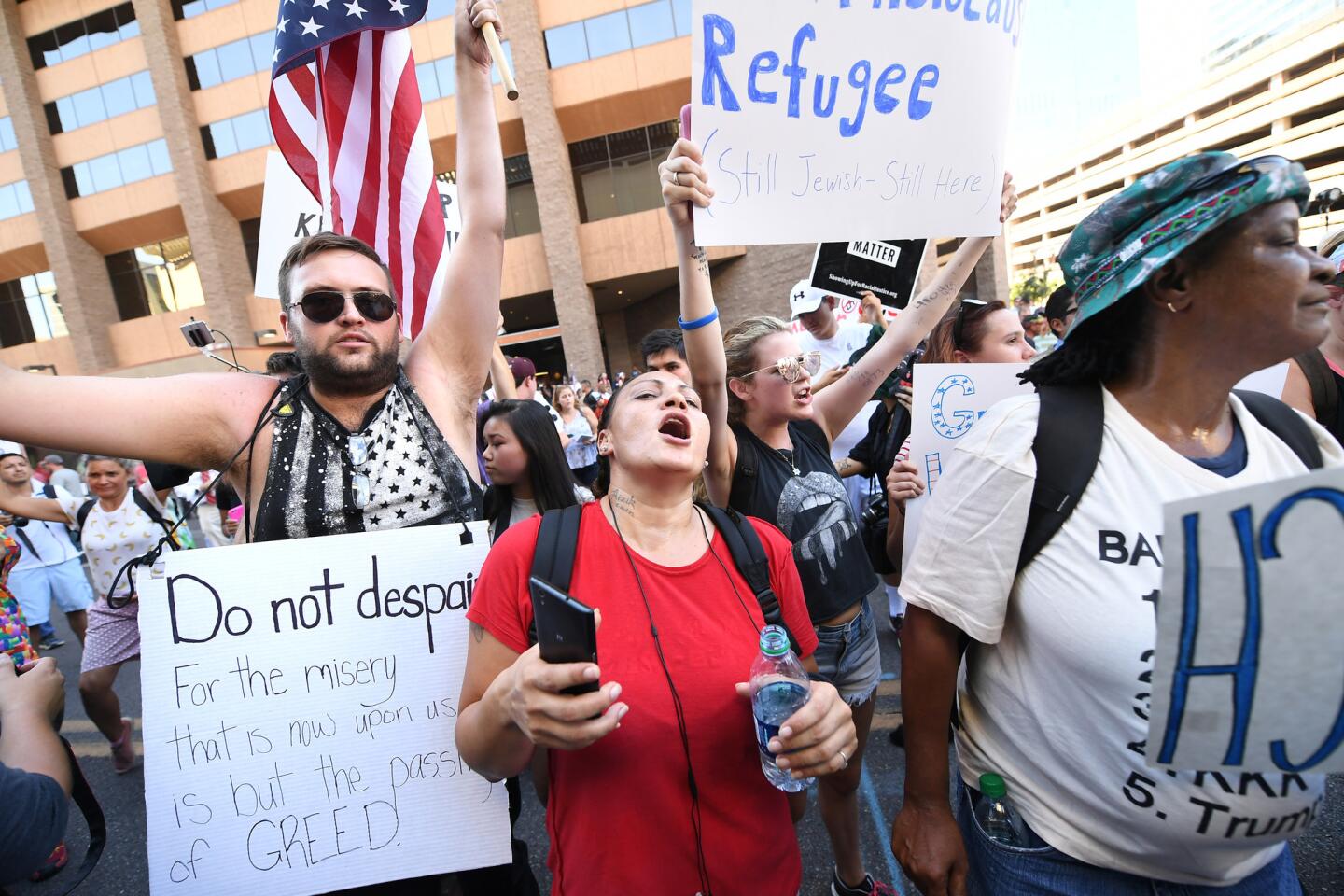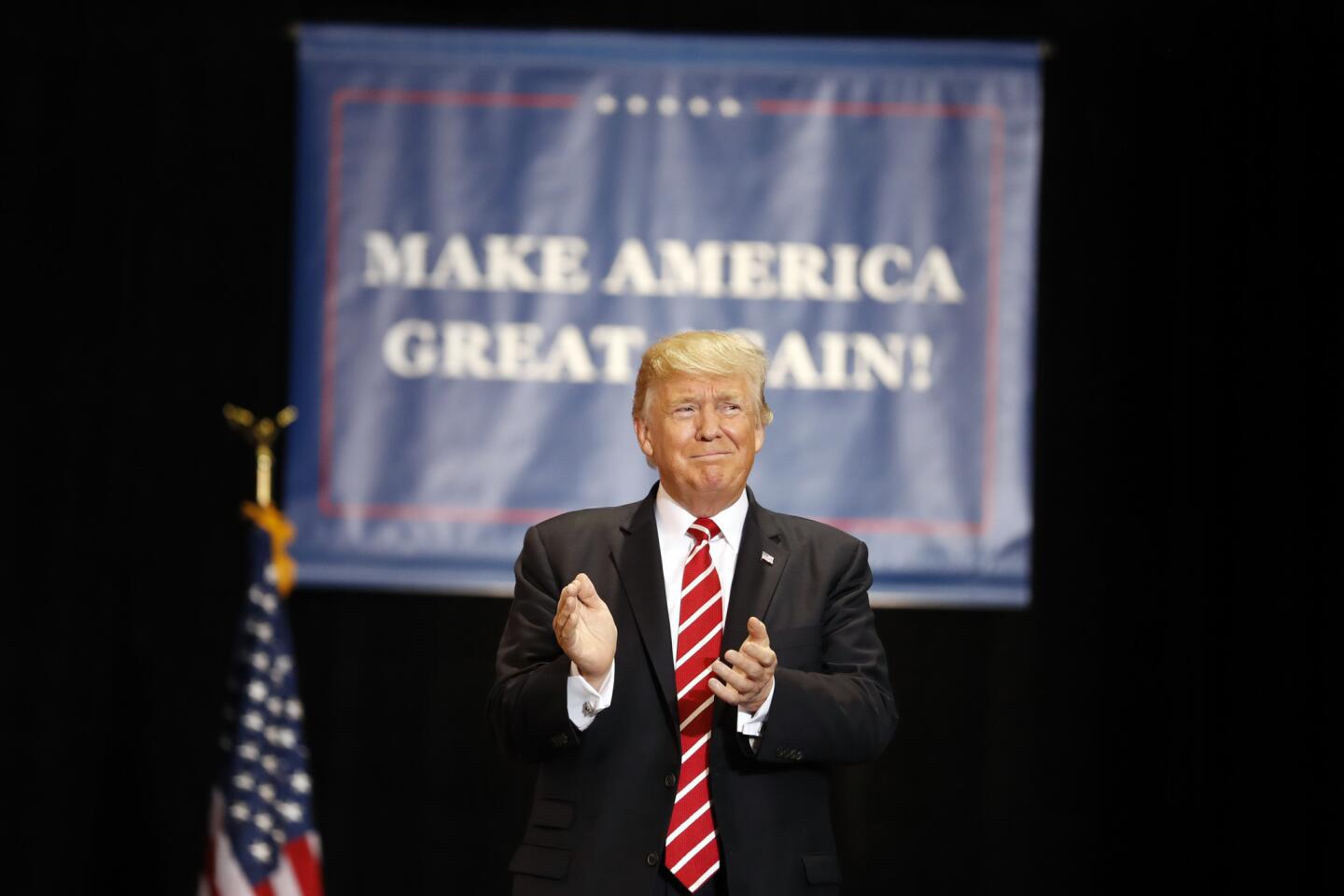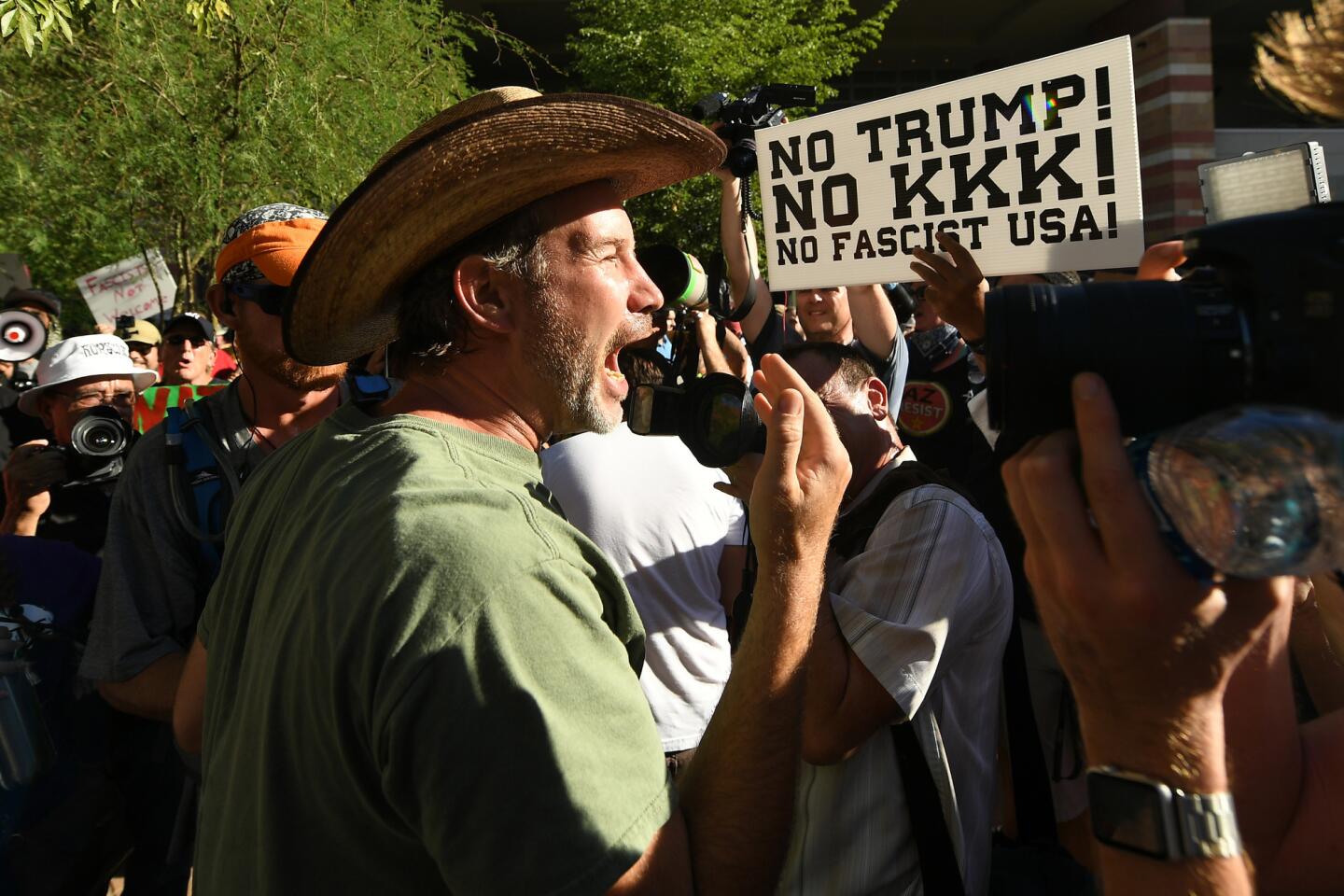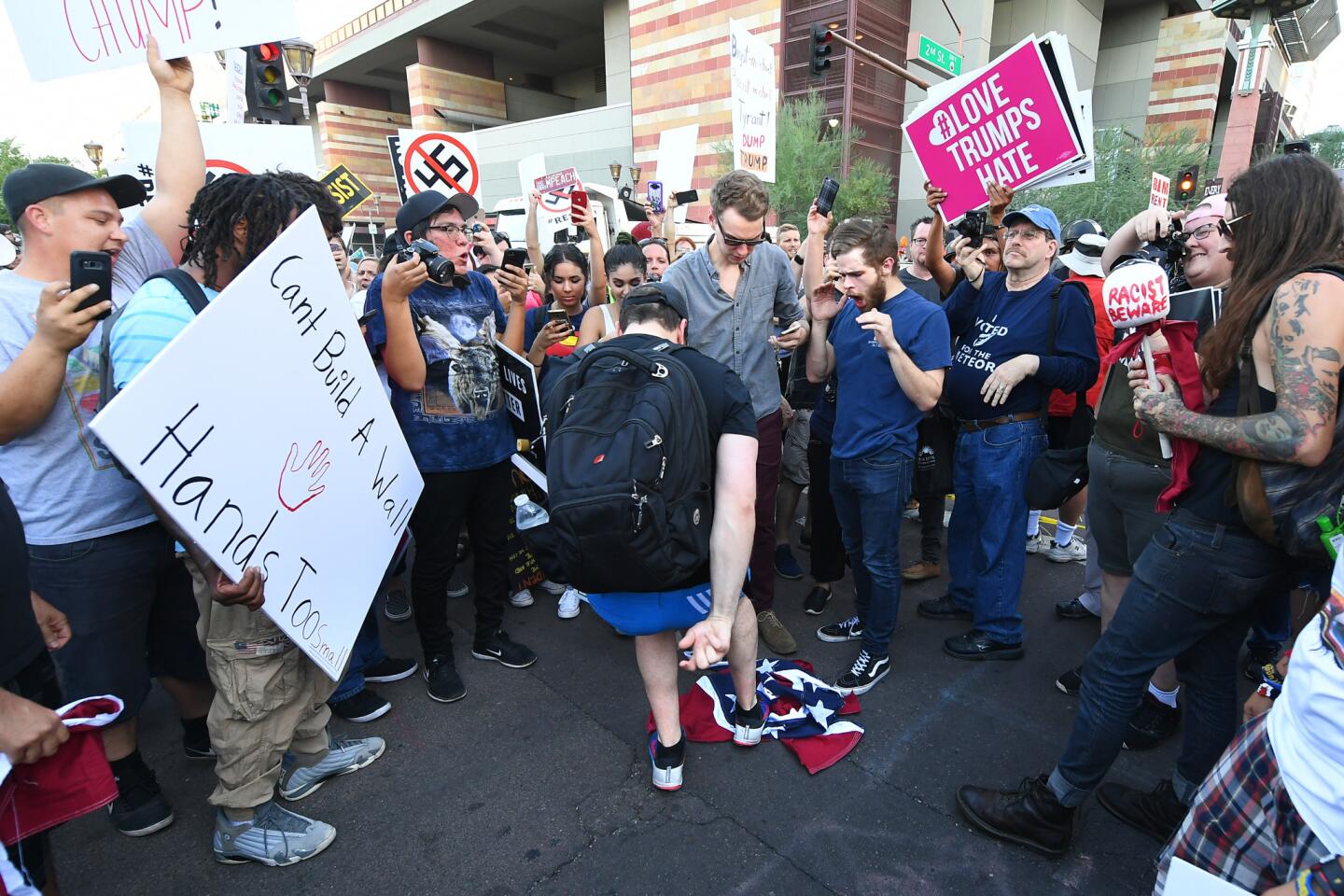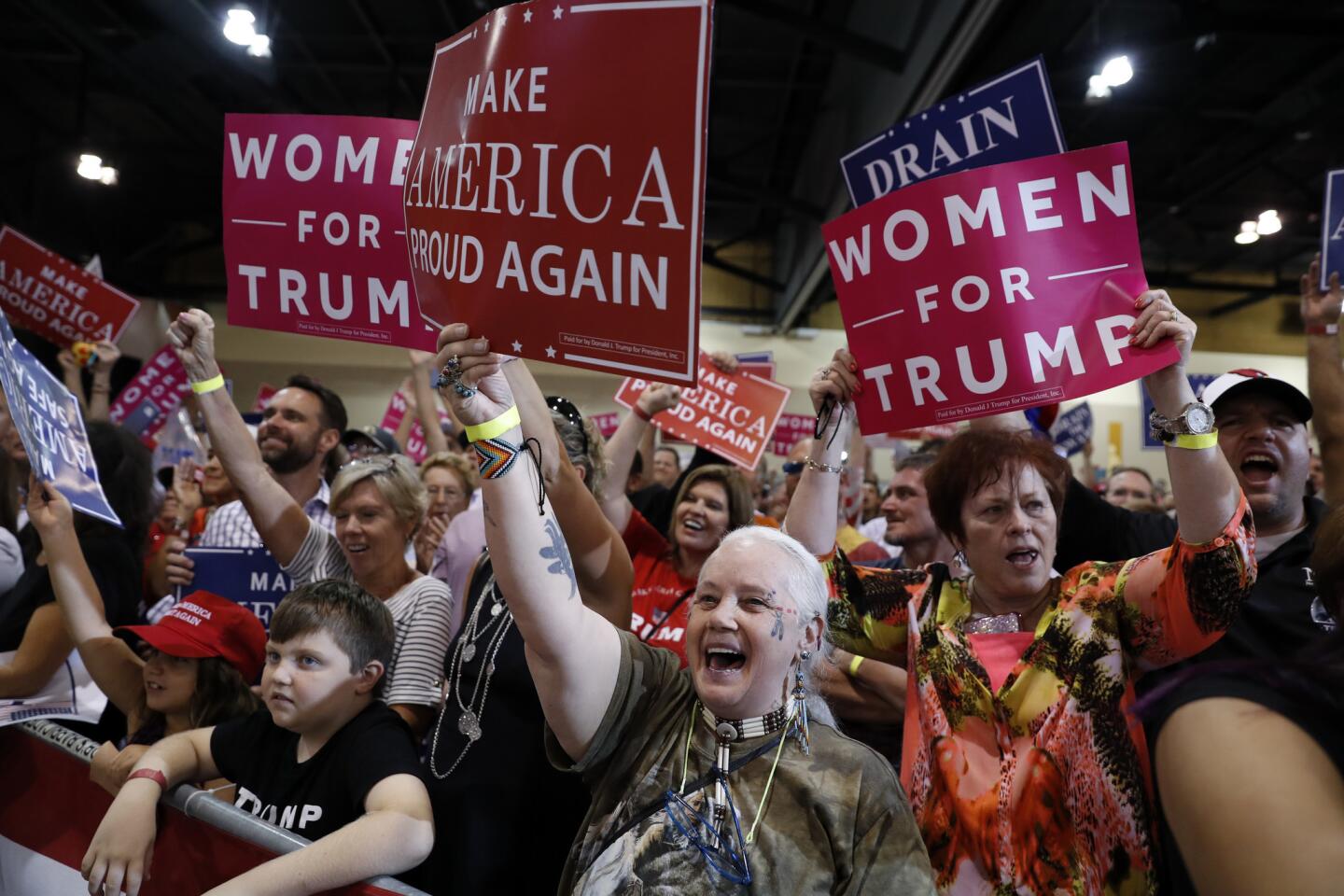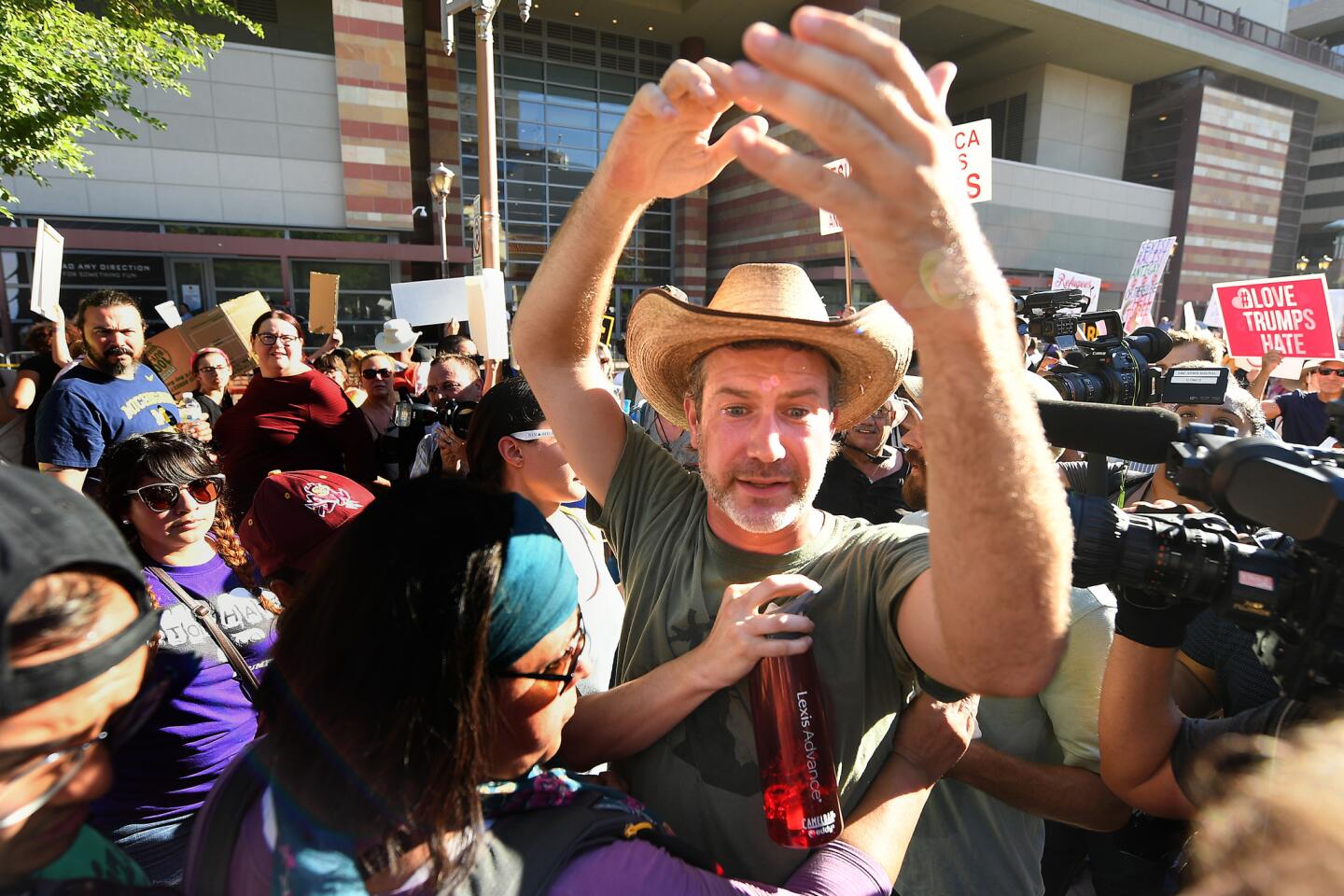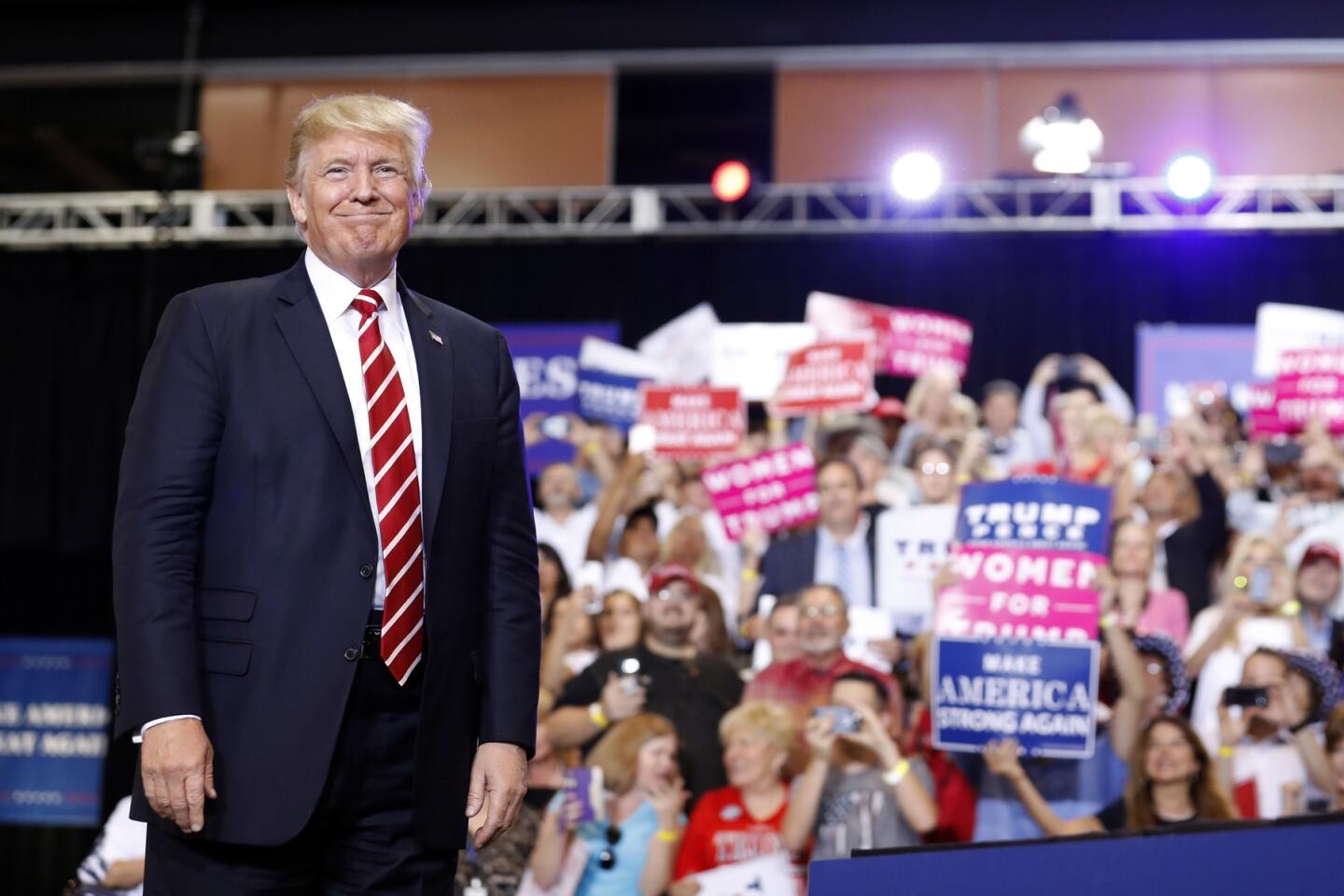Trump fills Phoenix speech with charged language, accusing media and fellow Republicans of failings

Trump covered topics ranging from the border wall to the events in Charlottesville. (Aug. 23, 2017) (Sign up for our free video newsletter here http://bit.ly/2n6VKPR)
- Share via
Reporting from Phoenix — As protesters massed on the streets of Phoenix, President Trump on Tuesday unleashed a vitriolic, 76-minute speech mocking those who considered his response to the Charlottesville white supremacist march racist, adopting racially charged language and hinting that he would pardon former Arizona Sheriff Joe Arpaio, long accused of brutality against Latinos.
He re-read for more than 16 minutes the remarks he had uttered after violence in Virginia claimed the life of a woman protesting the white supremacists, omitting the remarks in which he said that both sides were to blame and occupied the same plane in his view.
“The words were perfect,” he said.
But even as he sought to dismiss one racially fraught controversy, he ignited another with words that seemed to promise a pardon to Arpaio, who last month was convicted of contempt of court for refusing to halt his habit of stopping Latinos based solely on a suspicion that they might be living in the United States without proper papers.
“Do the people in this room like Sheriff Joe?” Trump asked a crowd of thousands in the Phoenix Convention Center of Arpaio, who served 24 years as Maricopa County sheriff before being defeated in November. “So was Sheriff Joe convicted for doing his job?”
“I’ll make a prediction: I think he’s going to be just fine,” Trump said, eliciting a roar. “But I won’t do it tonight because I don’t want to cause any controversy.” He added that Arpaio should “feel good.”
Trump’s defense of his own words and his repeated suggestion that it was time to return to law and order carried the whiff of past campaigns, such as those carried out by George Wallace, the late segregationist presidential candidate and governor of Alabama.
Trump suggested it was folly for Republicans to wish for the one thing many keenly wanted — for him to revert to the moderate, sober president who only 24 hours earlier had acknowledged the need to change his mind on Afghanistan with a patient speech.
It was clear Tuesday, in both Trump’s rhetoric and his freewheeling, far more enthusiastic visage, that the man who came to office tossing jaw-dropping assertions at voters would continue to favor that approach as president.
He saved his greatest criticism for the media, whom he blamed for misconstruing his remarks after Charlottesville. His supporters backed him up by screaming at reporters at the rally.
“It’s time to expose the media … for their role in fomenting divisions in the country,” he declared.
“They are trying to take away our history and heritage … we’re smart people and these are truly dishonest people.”
He added: “I really think they don’t like our country. The only people giving a platform to these hate groups is the media itself.”
For all the mockery and bluster, however, there was a subtext of political fear.
Recent polls have indicated that even among Republicans, Trump is losing strength. He was introduced Tuesday with a bevy of friends — Vice President Mike Pence, preacher Franklin Graham, Martin Luther King Jr.’s niece Alveda King and Housing and Urban Development Secretary Ben Carson.
Their multiracial tableau seemed intended to bolster Trump’s image. When he took the stage, he took pains to try to recreate the “silent majority” who he has long said delivered him the presidency.
“The media can attack me, but where I draw the line is where they attack you,” he said, after almost half an hour of defending himself.
He described his supporters as “honest, hard-working, taxpaying” Americans whose dreams he shared. “You always understood what Washington, D.C., did not — our movement is a movement built on love,” he said.
The protests that greeted Trump in Phoenix were largely peaceful, although later in the night the actions grew more violent and tear gas was fired.
Still, the signs of division were many. When Trump arrived in Phoenix after stopping at an immigration facility in Yuma, Republican Gov. Doug Ducey greeted him at the airport. But he did not attend the rally.
“Gov. Ducey’s focus has been working with law enforcement toward a safe event in downtown Phoenix,” his spokesman said in a written statement to the Arizona Republic.
Trump did his best to sow division elsewhere in the state’s politics.
Besides the possibility that he might pardon Arpaio, Republicans feared Trump would use the occasion to endorse a challenger to GOP Sen. Jeff Flake, a longtime nemesis. Trump also has fought recently with the state’s senior senator, John McCain, even after the Republican’s recent diagnosis of brain cancer.
Trump last week praised the sole GOP challenger at the moment, former state Sen. Kelli Ward, and many Republicans here worried he would ignite an internal party conflagration that would deliver the Senate seat to Democrats.
He did not endorse Ward — or any others considering the race — but mocked the two senators from his party.
Raising the subject of the failed GOP effort to repeal and replace Obamacare, Trump repeatedly noted that the Senate fell “just one vote away from victory after seven years of everyone proclaiming ‘repeal and replace.’ One vote,” he said, referring to McCain.
At that, a member of the audience screamed “Traitor,” seemingly referring to the Navy veteran who spent years as a Vietnam War prisoner before going into politics.
Trump, in a sarcastic tone, characterized Flake as an inconsequential senator.
“Nobody wants me to talk about him,” Trump said. “Nobody knows who the hell he is.... See, I haven’t mentioned any names and now everyone is happy.”
The president arrived in Arizona, which he won handily nine months ago, with his administration reeling, most recently at his own hand.
The president, top aides and family members remain embroiled in a special prosecutor’s investigation into Russian influence in the November election. Unified Republican control of Washington has led to few if any major legislative victories, although he claimed again Tuesday to be the most successful president considering his first six months.
A poll released in Arizona this week said 74% of Republicans supported Trump, meaning he has lost a significant quarter of his own party base.
For any previous president, that would have meant buckling down and working with Republican leaders in the Senate and the House.
Instead, true to form, Trump on Tuesday criticized the GOP leaders on Capitol Hill, obliquely. He also did something worse: Not until more than an hour into his speech did he mention with any detail his own party’s prime goal this fall — tax reform.
It was a passage replete with the Trump approach. First he blasted a threatened Republican senator, Flake — whose loss would give Republicans only 51 seats, the thinnest majority — and then he suggested that Capitol Hill do his bidding.
“We need the help of Congress,” he said. Providing no details, he added, “We’re giving you the biggest tax cut in the history of the country.”
Times staff writer Kurtis Lee contributed to this report from Phoenix.
Updates on California politics
ALSO
No nation-building in Afghanistan? Easier said than done, experts say
Kushner heads to Israel for latest attempt at peace deal
Outside Trump’s rally, thousands take to the streets in mostly peaceful protests
UPDATES:
9:50 p.m.: The article was updated with details from Trump’s rally in Phoenix.
3:25 p.m.: The article was expanded and updated with additional details of Trump’s visit to Arizona.
The story was first published at 9:30 a.m.
More to Read
Get the L.A. Times Politics newsletter
Deeply reported insights into legislation, politics and policy from Sacramento, Washington and beyond. In your inbox twice per week.
You may occasionally receive promotional content from the Los Angeles Times.
